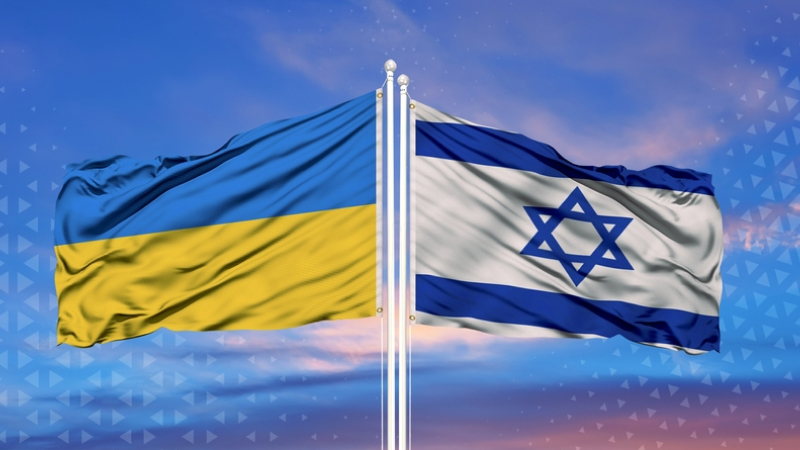
Many people who visited Ukraine before the war report a particular feeling in the air. After many years of depreciation, it was a feeling of a renaissance — the realization of Ukraine as an independent, unique, and powerful nation.
With a full-scale russian invasion, Ukraine, however, once again was dragged into a fierce struggle for its independence that many people call the last colonial war in Europe.
Today, the whole civilized world has taken the Ukrainian side but only few countries can understand the full extent of what Ukraine is going through and how it lives today. In this regard, this is something our global teams in Israel and Ukraine have in common, in a way, working in the same boat.
The conflicts in these countries undeniably have different political and cultural undertones, and their social conditions are also hard to compare but working as an outstaffing vendor in both countries, we have an inside perspective that shows them moving on the same track (mainly digital) — and find empowerment in their fight for independence.
Today, we would like to share this perspective with you, showing how Ukraine and Israel keep business continuity and remain powerful startup and tech nations in wartime.
Working in the Same Boat: What do Ukrainian and Israeli Teams Have in Common?
Startup nations
Ukraine and Israel have got the recognition of powerful start-up nations transforming the tech sector around the world. After all, both of these countries prove that creativity and out-of-box startup ideas are the major catalysts of success.
Both Ukraine and Israel seem to have an inexhaustible pool of talent and creative ideas that drive business around the world forward.
For instance, many Israeli startups and established businesses like Payoneer, MyHeritage, BeeWise, Playtech, Wix, and Connecteam got worldwide recognition and attracted billions of investments into their native country. In 2021 this number reached over $25B. With a modest relatively small population of 9M people, Israel has developed an impressive number of 97 unicorns.
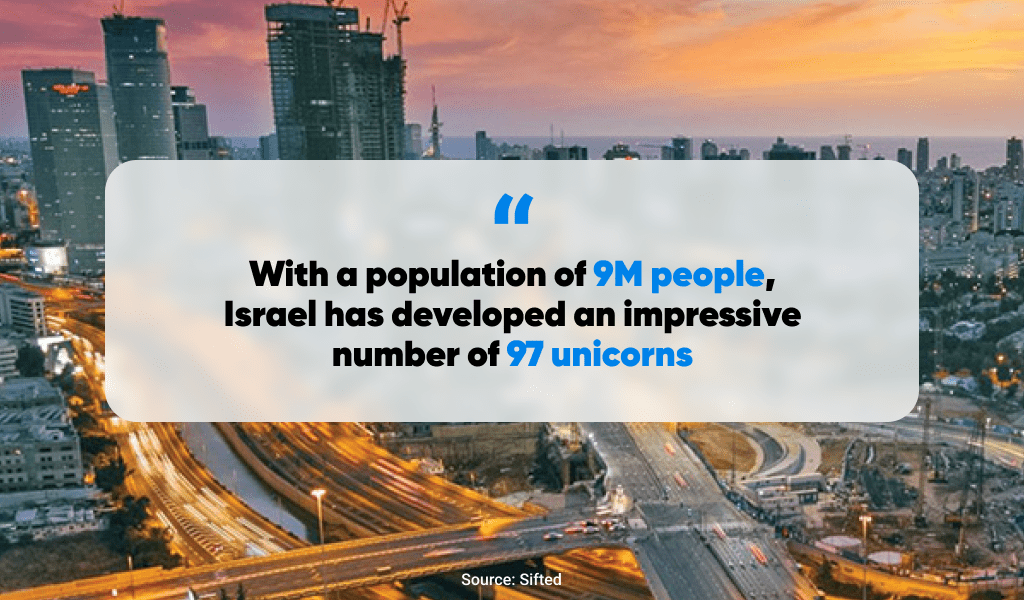
However, Israel was not always a home for the best startups in the world. Proclaiming independence in 1948, Israel has initially thrown all forces into protecting itself militarily. Israel’s military, defense, and significant aerospace R&D spending was its primary source of funding until the 1990s.
Later, this strategy certainly pays off. A good example is Israel’s military intelligence organization Unit 8200, which has provided graduates with access to cutting-edge technologies. As a result, more than a thousand firms have been started by former members so far. Only much later in 1993, did the accents shift, and Israel started to invest in startups and strategically important businesses by creating “clusters” of high-tech startups and venture capital investments.
Dealroom claims that over the previous ten years, VC funding into Israel has been rising rapidly, hitting $10 billion in 2021.
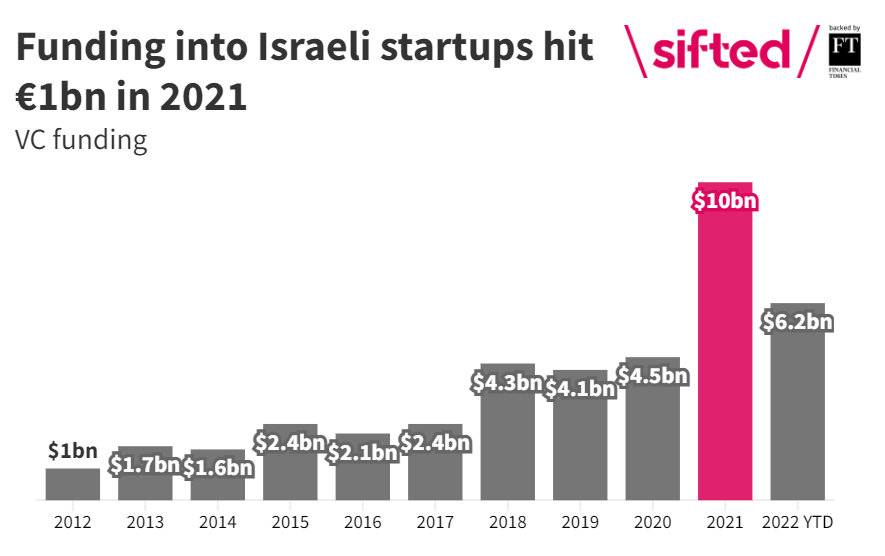
2021 VC Funding into Israeli Startups | Sifted
Due to various political and economic reasons, Ukraine receives fewer investments, in 2021 it amounted to $1.68B. Compared to Israel, however, Ukraine has a significantly larger pool of specialists, being in the top 5 countries with the largest number of certified IT experts.
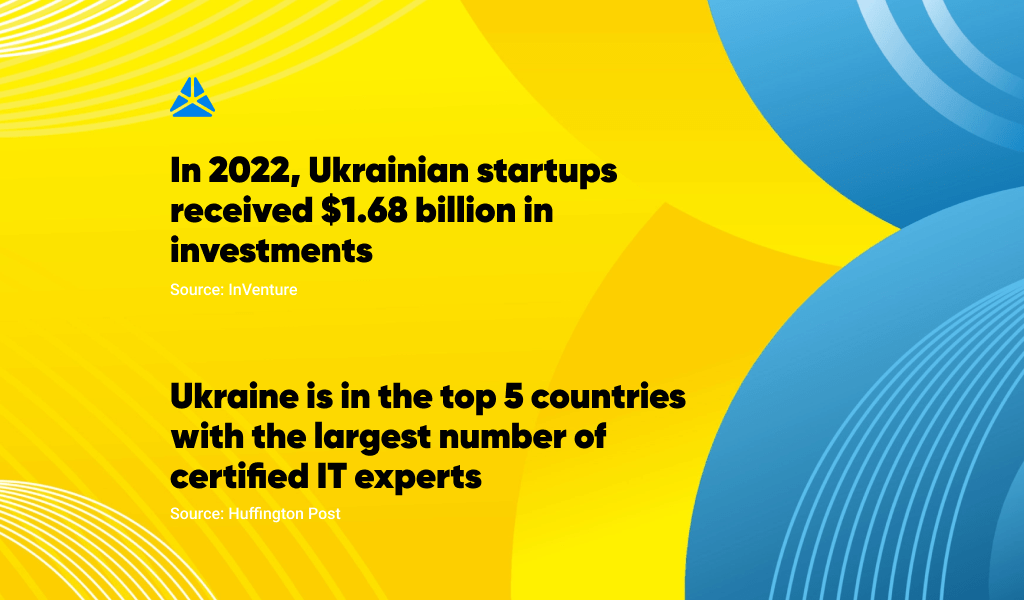
2021 VC Funding into Ukrainian Startups | Source: InVenture | Huffington Post
The fastest-growing Ukrainian startups include typing assistant Grammarly, GitLab, Creatio, and the face-swapping app Reface. According to statistics, 92% of Ukrainian start-up founders agree that recent developments in Ukraine’s ecosystem made Ukraine a “best place to seek growth for a startup business.” Despite half of the firms in the survey having a legal company outside of Ukraine, 82% still keep their complete founding staff there. According to estimations, by 2025, the high-tech industry of Ukraine is projected to generate $10B.
Deep business and cultural interconnection between Ukraine and Israel
Having more rounds of startup funding, the Israeli market has a talent pool four times smaller than Ukraine. This way, it’s easier for Israel to attract specialists from the Ukrainian talent market to catch up with the growing number of business initiatives in the country.
Thus, currently, Ukrainian developers and programmers are a driving force behind various Israeli startups and acknowledged companies, including the above-mentioned Wix, Playtika, and Payoneer.
Ukraine has grown to be a significant place for Israeli firms in the IT sector who maintain affiliate offices or own R&D Centers there due to its position as a major IT hub and outsourcing destination in the globe. Reportedly, around 15,000 Ukrainian workers are employed by Israeli high-tech companies.
Israel and Ukraine also support regular cultural and business exchanges that are basic for business relationships. According to the Ukraine Crisis, only last year, 150,000 Israelis visited Ukraine and 165,000 Ukrainians visited Israel.
Challenging work environment
Just like in Israel, the war in Ukraine might last for years. For Ukraine, the situation is that even after the victory and withdrawal of troops, clashes with hostile neighboring countries remain possible. For Ukrainians who are not ready for this, it is better to leave the country, says Oleksiy Arestovych, Advisor to the Office of the President of Ukraine.
In a recent TV interview, Oleksiy also says that the war with Russia may last until 2035. During this period, regular military clashes are inevitable, according to him.
In the case of Russian aggression, however, the military clashes are regularly combined with the terror of the Ukrainian civil population. The latter makes the working environment of specialists who left Ukraine extremely challenging.
In a recent comment to reporters, the President of Ukraine, Volodymyr Zelenskyy says he wants his country to become a ‘big Israel’ with its own face” identifying security as a top issue in the next 10 years.
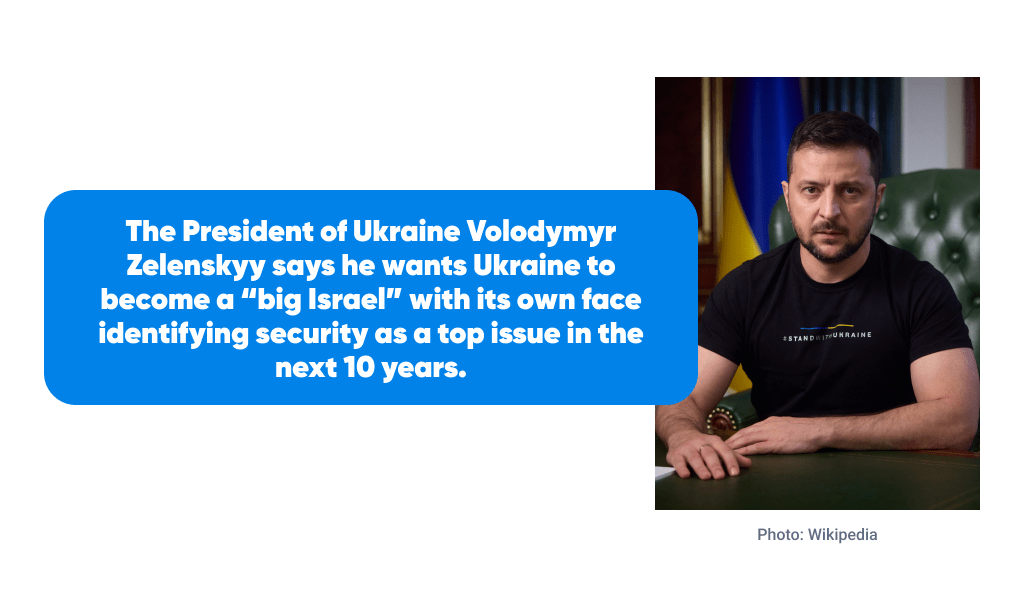
Volodymyr Zelenskyy | Photo: Wikipedia
However, if Ukraine wants to become the “new Israel”, the government should understand that people must also be provided with everything necessary for protection. In this regard, Israel has all the required means and support infrastructure. For example, according to the Civil Defense Law of 1951, all houses, residential buildings, and industrial buildings in Israel must have bomb shelters. Each Israeli family, for example, is assigned to a bomb shelter, and every person is supplied with gas masks.
The severe war conditions in Ukraine, however, have also launched this process naturally and accelerated it. Being initially unaware of even basic security principles, today, just like all Israelis, every Ukrainian knows what to do in case of an attack, and has a supply of products, cash, and generators for power outages. More comfortable shelters are appearing all over the country, including at bus stops.

The first shelter for public transport passengers in Kharkiv, Ukraine | Photos: Suspilne Media
Humanitarian volunteers work across the country and deliver life-saving supplies to populations in need. Meanwhile, the territorial defense provides safety and peace for civilians in schools, public places, and workplaces.
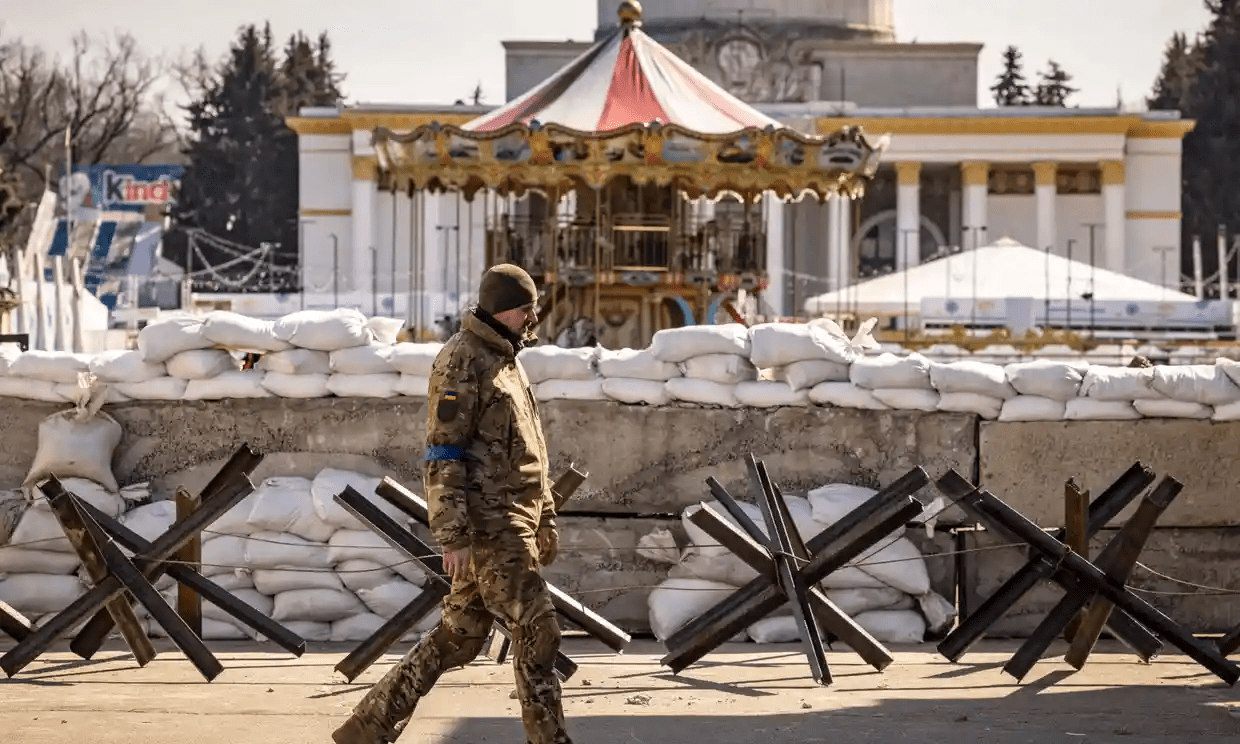
Territorial Defense in Kyiv | The Guardian | Fadel Senna
Best Business Continuity Practices Ukraine and Israeli Implement in Wartime
Enhanced remote communication and logistics
In today’s troubled world, the covid pandemic had one unexpectedly positive effect — we got used to working remotely and already created all means and channels required for that.
War, of course, is extreme but the Ukrainian case proves that even during the collapse, the flexibility of communication matters as since the beginning of the invasion all economic and banking structures in Ukraine remained stable, preventing the spread of panic and chaos in the country.
Communication, however, is just one side. Since not everyone can remain productive in such an extreme environment.
Over the covid years, Ukraine became a global remote work hub. The global distribution of teams came in handy when the war struck. The majority of Ukrainian IT specialists at the time worked remotely, so the transaction period and adaptation to remote working tools in their case were eliminated.
For us, as a global outstaff provider, the spread of digitalization also helps to organize the uninterrupted business process for our clients.
Security (broad concept in these countries)
Cyber security is one of the biggest challenges in our time. But in Israel and Ukraine, the physical one is just as relevant.
For example, Israeli offices, administrative buildings, shops, hotels, and even bus stops are equipped with all sorts of shelters and all means of protection.
Although not every building and business center can yet boast of the presence of its own shelters in Ukraine, the country is definitely making progress in this direction as new and more comfortable shelters appear on the map in each city. Some of them are former restaurants with Wi-Fi, coaches, and the required supply of food and drinks. Although not every building and business center can yet boast of the presence of its own shelters, their number increases.
Notably, even daily operations caused by the war got digitized in Ukraine with the introduction of hundreds of apps and interactive maps. With the last, one real-time can track the air raid alarms and other possible threats across the country, find the nearby shelters in their city and even report about enemies, saboteurs, and their equipment.

Air Raid Alarm App
In the run-up to the invasion, Ukraine also experienced a series of cyberattacks aimed at leaking the data of thousands of Ukrainians and disrupting government institutions. All of them, however, were successfully repelled thanks to the significant contributions to cyber security that the country made in recent years.
Thus, just like the Israelis, surely Ukraine is getting used to living in wartime with a major effect of it on their lives. The investment they made into digital has paid off.
Digital investment that pays off
High tech’s importance to the Ukrainian and Israeli economies cannot be overestimated. Today it seems that war has no apparent impact on Israel’s growing economy. However, according to the World Bank database, by 1995, only 7.9% of Israel’s GDP was allocated to military spending. Speaking of the initial impact of war, it is estimated the mobilization in the first 3 months of the war cost the economy some $ 750 million. That loss, 15 to 20% of the gross national product, was separate from the billions spent for the upkeep of the armed forces and for the replacement of material destroyed in the fighting.
In 2022, Ukraine has found itself in the same situation as this year, the region’s economy in Ukraine is forecast to shrink by 4.1%, compared with the pre-war forecast of 3% growth, as the economic shocks from the war compound the ongoing impacts of the COVID-19 pandemic.
For both Ukraine and Israel, IT and software development is an important segment of the economy. In Ukraine it accounts for 4% of the country’s entire GDP, making this sector crucial for the country’s economy. The same goes for Israel, where the tech sector share comprises 15.3% of Israel’s total GDP.
Examination of the public high-tech companies in Israel reveals further evidence of the growing significance of the high-tech industry to the local economy.
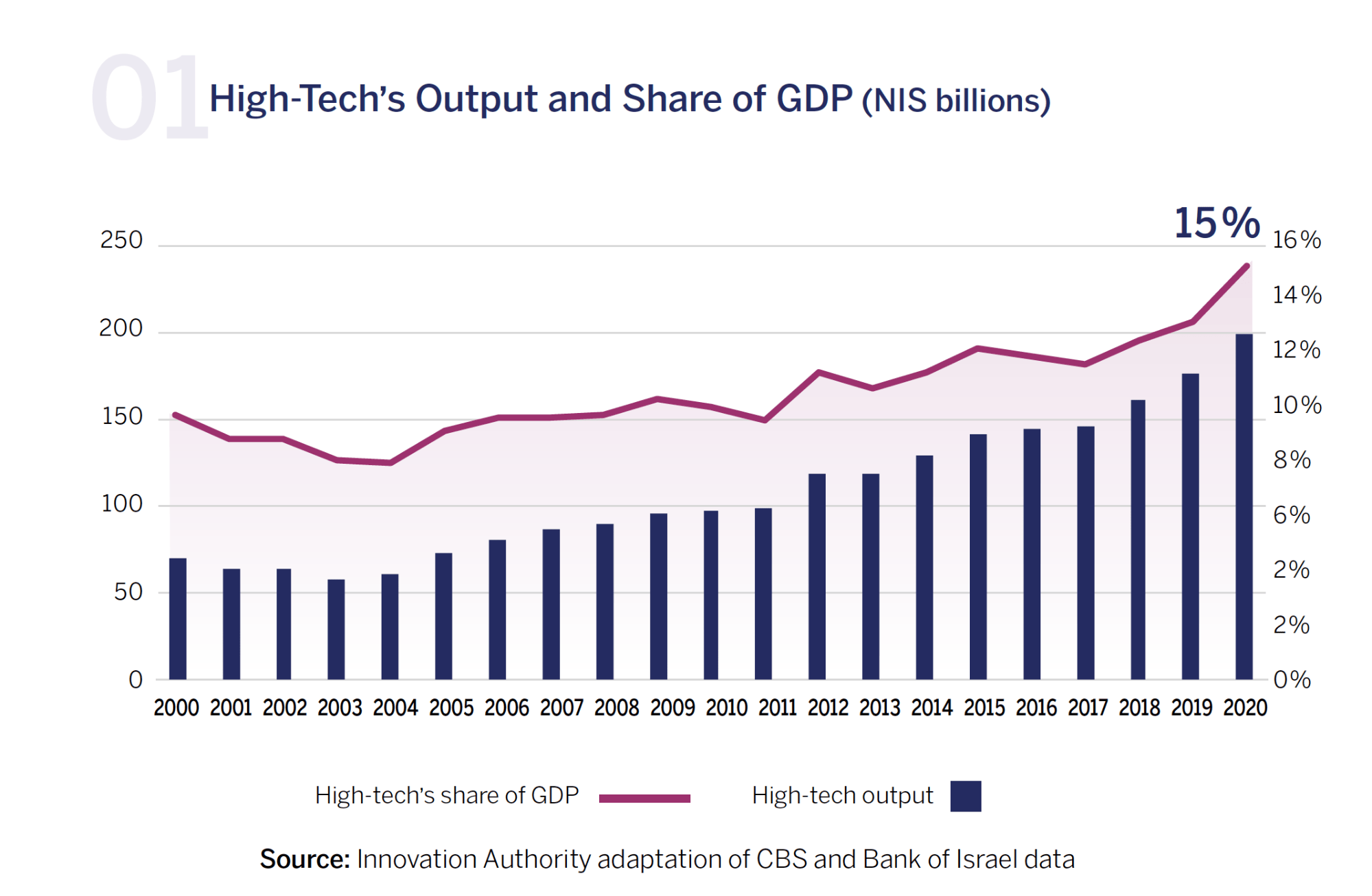
In recent years, Ukraine has made a significant emphasis on the development of digital technologies. But especially during the war, the need to restore documents, report war crimes, or get financial support from the state becomes not only a new reality but also urgent.
In the war context, many of these issues could be very challenging and extremely laborious. Even during the war, however, Ukrainian developers continued to come up with innovative ideas that streamline the communication between the state and citizens and inform them about potential dangers.
In 2020, the Ministry of Digital Transformation was launched in Ukraine as a separate government institution. As a result, a wide range of ambitious projects is operating in Ukraine. That includes Diia, the platform that provides access to digital documents and essentially has the full power of an official ID within the country. This, in turn, helps to eliminate a whole chain of bureaucratic processes while getting public services. For example, becoming an entrepreneur in Ukraine takes just 10-15 minutes. Since the beginning of the war, Diia has expanded and now allows recording property damage and getting compensation from the state. At the moment, Diia is used by 5 million users. Meanwhile, Ukraine is the first country where digital ID is completely valid.

Digital ID in the Diia App
The history of both Ukraine and Israel shows the importance of digital investment as a secure foundation for the future. Thus both countries create state policies that support the creation of infrastructures necessary to develop innovative technologies and train the next generation of high-tech employees.
How to Help Ukraine and Israel: Leverage Their Best Practices and Digital-Savvy People
Amid the war, Israel and Ukraine did not lose their cultural ties but on the contrary, found additional ones and currently actively cooperate. In 2022, over 62% of Israeli companies increased recruitment and despite the war, Ukraine is still among their favorite destinations. This can be confirmed by the growing number of requests from both sides, MWDN receives as an outstaff service provider.
Outstaffing means a reinforcement of a software development team with professionals from required domains. As an outstaff service provider, MWDN recruits specialists in the best tech and talent-powered regions of the world that include Canada, America, Israel, and Ukraine.
During 20 years on the market, we implemented a wide range of products and solutions that enjoyed great success on the market. Contact us and learn more about our approach to finding the best talents on the global market.
Content
- 1 Working in the Same Boat: What do Ukrainian and Israeli Teams Have in Common?
- 2 Best Business Continuity Practices Ukraine and Israeli Implement in Wartime
- 3 How to Help Ukraine and Israel: Leverage Their Best Practices and Digital-Savvy People
